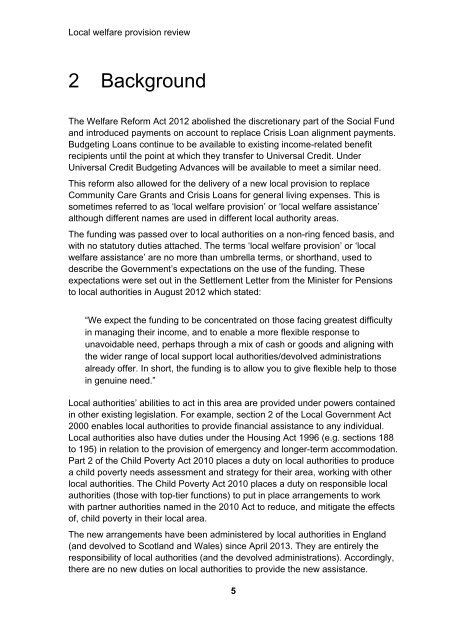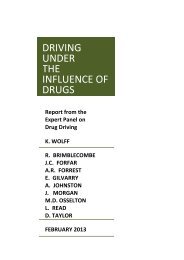2-local-welfare-provision-review-nov-2014
2-local-welfare-provision-review-nov-2014
2-local-welfare-provision-review-nov-2014
Create successful ePaper yourself
Turn your PDF publications into a flip-book with our unique Google optimized e-Paper software.
Local <strong>welfare</strong> <strong>provision</strong> <strong>review</strong>2 BackgroundThe Welfare Reform Act 2012 abolished the discretionary part of the Social Fundand introduced payments on account to replace Crisis Loan alignment payments.Budgeting Loans continue to be available to existing income-related benefitrecipients until the point at which they transfer to Universal Credit. UnderUniversal Credit Budgeting Advances will be available to meet a similar need.This reform also allowed for the delivery of a new <strong>local</strong> <strong>provision</strong> to replaceCommunity Care Grants and Crisis Loans for general living expenses. This issometimes referred to as ‘<strong>local</strong> <strong>welfare</strong> <strong>provision</strong>’ or ‘<strong>local</strong> <strong>welfare</strong> assistance’although different names are used in different <strong>local</strong> authority areas.The funding was passed over to <strong>local</strong> authorities on a non-ring fenced basis, andwith no statutory duties attached. The terms ‘<strong>local</strong> <strong>welfare</strong> <strong>provision</strong>’ or ‘<strong>local</strong><strong>welfare</strong> assistance’ are no more than umbrella terms, or shorthand, used todescribe the Government’s expectations on the use of the funding. Theseexpectations were set out in the Settlement Letter from the Minister for Pensionsto <strong>local</strong> authorities in August 2012 which stated:“We expect the funding to be concentrated on those facing greatest difficultyin managing their income, and to enable a more flexible response tounavoidable need, perhaps through a mix of cash or goods and aligning withthe wider range of <strong>local</strong> support <strong>local</strong> authorities/devolved administrationsalready offer. In short, the funding is to allow you to give flexible help to thosein genuine need.”Local authorities’ abilities to act in this area are provided under powers containedin other existing legislation. For example, section 2 of the Local Government Act2000 enables <strong>local</strong> authorities to provide financial assistance to any individual.Local authorities also have duties under the Housing Act 1996 (e.g. sections 188to 195) in relation to the <strong>provision</strong> of emergency and longer-term accommodation.Part 2 of the Child Poverty Act 2010 places a duty on <strong>local</strong> authorities to producea child poverty needs assessment and strategy for their area, working with other<strong>local</strong> authorities. The Child Poverty Act 2010 places a duty on responsible <strong>local</strong>authorities (those with top-tier functions) to put in place arrangements to workwith partner authorities named in the 2010 Act to reduce, and mitigate the effectsof, child poverty in their <strong>local</strong> area.The new arrangements have been administered by <strong>local</strong> authorities in England(and devolved to Scotland and Wales) since April 2013. They are entirely theresponsibility of <strong>local</strong> authorities (and the devolved administrations). Accordingly,there are no new duties on <strong>local</strong> authorities to provide the new assistance.5



